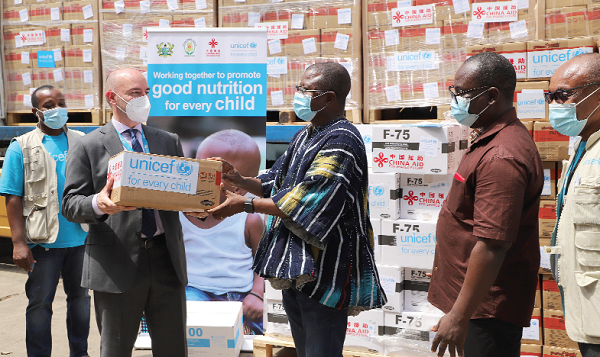
UNICEF, Chinese govt support COVID-19 response team
The United Nations Children’s Fund (UNICEF), in collaboration with the Chinese government, has donated ready-to-use therapeutic food (RUTF) to the National COVID-19 Response Team to help tackle malnutrition in the country.
The malnutrition intervention is targeted at 115,112 children, 128, 925 adolescents and 23,022 women in the North East Region.
Under the brand name Plumpy Nuts, it is an energy-dense, mineral and vitamin enriched food that does not require preparation and is designed specifically to treat severe acute malnutrition.
Described as a life saver, the essential food supplies are to be administered by health institutions in the North East Region.
The donation was funded by the Chinese government through a $1 million China-UNICEF cooperation against COVID-19 and through China's South-South Cooperation Assistant Fund.
Ceremony
Presenting the supplies to the Ghana Health Service in Accra yesterday, the Deputy UNICEF Country Representative, Mr Fiachra McAsey, commended the government for its determined efforts to address under nutrition and child and maternal mortality.
He also used the opportunity to thank the government of China for responding generously to the COVID-19 situation in the country in the context of nutrition and health.
“As we pay attention to preventing further transmission and providing care for people who have been affected by COVID-19, it is important that the overall health and wellbeing of children is not overlooked, since children constitute a part of victims who are kept out of sight in this pandemic,” he said.
He said COVID-19 was having a significant impact on children due to higher case loads and school closures, since there was reduced access to basic health and nutrition services.
Unfortunately, Mr McAsey said, children in regions such as the North East which had pre-existing health and nutrition challenges, were likely to suffer most.
“We are happy therefore that these supplies are departing today for distribution among 132 health institutions across the North East Region.
“For example, according to the Multiple Indicator Cluster Survey of 2017, even before the coronavirus outbreak in Ghana, stunting among children under five years in the Northern Region (which included North East at the time of data collection) was estimated at 29 per cent in comparison to the national average of 15 per cent,” he said.
He said UNICEF, as part of the UN Country Team in Ghana, was honoured to be working side by side with the Ghana Health Service (GHS) to promote child health and improve upon progress made together, adding that UNICEF was looking forward to further strengthening the strategic partnership between the two institutions.
“The team at UNICEF is proud to have undertaken this important initiative and is committed to delivering results that will contribute to joint efforts by the government, DPs and the UN to achieve an impact that was sustainable, especially towards accomplishing targets in Goal Three of the Sustainable Development Goals.
“The COVID-19 crisis threatens to derail progress made so far to improve child health and nutrition in Ghana. It is important that we act now and fast to realise the right of every child to quality health care,” he added.
Response
The Director in charge of Family Health at the GHS, Dr Kofi Issah, received the supplies on behalf of the Director-General of the GHS, Dr Patrick Kuma-Aboagye, and expressed his gratitude to the government of China and UNICEF for the gesture.
He said the supplies had come at the right time, since the prevalence of malnutrition in the North East Region was already high and with the lean season approaching, the people were only left with grains and cereals for replanting.
“During this time, the nutritional needs of children and women, in particular, is at stake, requiring that additional interventions are established to stop the circumstances of malnutrition in the area from worsening.
He said the life-saving ready-to-use therapeutic food would help make up for the nutritional needs of children.
Dr Issah said a nation’s development depended on a healthy and productive workforce whereas the health of its population was hinged on nutrition.
Writer’s email:
